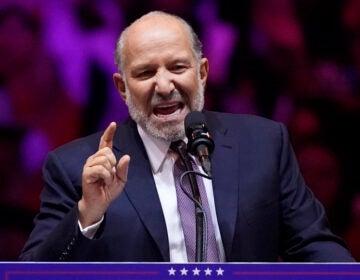Pa. House, in contentious session, moves state budget forward
The bills now head to the state Senate, which returns Oct. 16.

The dome of Pennsylvania’s Capitol building in Harrisburg. (Kimberly Paynter/WHYY)
This story originally appeared on WITF.
In a sometimes chaotic and acrimonious late-night session Wednesday, the state House passed several pieces of legislation — known as code bills — to move the delayed state budget closer to the finish line.
The deadline for Pennsylvania to pass a budget was June 30, more than three months ago.
The Democratic-led House and the Republican-led Senate passed the main budget bill in July. But they haven’t come together since then on a series of bills needed to authorize spending.
Tempers flared in the House session, which was filled with debate about the constitutionality of the bills. Ultimately, the Democratic majority had its legislation passed.
While much of the budget was signed into law in early August, several programs, such as Whole Home Repair, remained unfunded.
Those programs were amended into legislation known as code bills — which provide guidelines for how funds are to be spent.
House Minority Leader Bryan Cutler of Lancaster County criticized the bills, saying over $1 billion will be left in the treasury.
“We will leave here today having passed a one-sided fiscal code bill that faces an uncertain future at best. And that budget will still be incomplete,” he said.
Majority Leader Matt Bradford of Montgomery County said that it was important to do what was necessary to complete the budget.
“Before us this evening is an honest attempt to facilitate those loose ends that came from the unilateral attempt to pass a GA bill without an agreed-to fiscal code in place,” he said.
The bills now head to the Senate, which returns Oct. 16.
Gov. Josh Shapiro’s signature on the main budget bill in August released millions of dollars for counties and school districts, The Associated Press reported.
But lawmakers still had to authorize spending on the rest of the $45 billion budget – including at least $1.1 billion for things such as student teaching stipend, student mental health grants, funds to boost some of the state’s poorest school districts, and hundreds of millions of dollars for state-owned universities, the AP reported.
WHYY is your source for fact-based, in-depth journalism and information. As a nonprofit organization, we rely on financial support from readers like you. Please give today.





